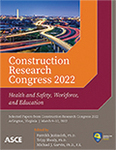Integrating Front-End Planning and Infrastructure Sustainability in Construction Education through Problem-Based Learning
Publication: Construction Research Congress 2022
ABSTRACT
Education in construction and sustainable disciplines mostly focus their pedagogies on vertical structures, emphasizing the planning pedagogy on traditional reactive planning techniques instead of advanced proactive methods as Front-End Planning (FEP). FEP supports defining the project scope, aligning stakeholders, and achieving sustainability at an early stage of the project. Therefore, it is critical to prepare our future workforce to realize the tools that foster meeting sustainability goals for infrastructure projects. This research evaluated the efficacy of proactive pedagogical approaches such as Problem Based Learning (PBL) activity at a Sustainable Construction class to assess the need to integrate FEP tools and sustainability for infrastructure projects in construction education. The results indicate that the activity fostered students’ familiarity with FEP tools and encouraged teamwork for attaining sustainable infrastructure projects. The results also demonstrate that almost 96% of the students strongly believe the FEP and infrastructure sustainability are fundamental topics that need to be included in construction engineering and management curricula.
Get full access to this article
View all available purchase options and get full access to this chapter.
REFERENCES
Amekudzi, A., Herabat, P., Bernhardt, K. L. S., and McNeil, S. (2000). “Educating students to manage civil infrastructure systems.” ASEE Annual Conference Proceedings, 2295–2304.
ASCE. (2007). “The Vision for Civil Engineering in 2025.” American Society of Civil Engineers, 18(4), 651–660.
Barlow, P. L. (2011). “Development and delivery of an integrated project-based jobsite management undergraduate course.” International Journal of Construction Education and Research, 7(1), 3–21.
Cho, C., and Gibson, G. E., Jr. (2000). “Development of a Project Definition Rating Index (PDRI) for General Building Projects.” Construction Congress VI, American Society of Civil Engineers, Reston, VA, 343–352.
CII (Construction Industry Institute). (2013). “Project Definition Rating Index - Infrastructure Projects.” Construction Industry Institute, Austin, TX.
Elkington, J. (1998). “Accounting for the Triple Bottom Line.” Measuring Business Excellence, 2(3), 18–22.
Elzomor, M., Mann, C., Doten-Snitker, K., Parrish, K., and Chester, M. (2018). “Leveraging Vertically Integrated Courses and Problem-Based Learning to Improve Students’ Performance and Skills.” Journal of Professional Issues in Engineering Education and Practice, 144(4).
Elzomor, M., and Parrish, K. (2017). “Positioning students to understand urban sustainability strategies through vertical integration: Years one through four.” ASEE Annual Conference and Exposition, Conference Proceedings, 2017-June.
Ferrer, V., Rahat, R., Pradhananga, P., and ElZomor, M. (2021). Pre-Course and Post-Course survey for integrating FEP and SI in Construction Education. Ann Arbor, MI: Inter-university Consortium for Political and Social Research.
Forcael, E., González, V., Orozco, F., Opazo, A., Suazo, Á., and Aránguiz, P. (2015). “Application of problem-based learning to teaching the critical path method.” Journal of Professional Issues in Engineering Education and Practice, 141(3), 1–11.
Hamilton, M. R., and Gibson, G. E. (1996). “Benchmarking pre-project planning effort.” Journal of Management in Engineering, 12(2), 25–33.
Harris, T., and Hardin, J. W. (2013). “Exact Wilcoxon signed-rank and Wilcoxon Mann-Whitney ranksum tests.” Stata Journal, 13(2), 337–343.
Hurtado, K. C., and Sullivan, K. T. (2014). “A proposed dynamic model for education in construction project planning.” ASEE Annual Conference and Exposition, Conference Proceedings.
ISI (Institute for Sustainable Infrastructure). (2018). Envision: Sustainable Infrastructure Framework Guidance Manual. Washington, DC.
McWhirter, N. D., and Shealy, T. (2018). “Teaching decision-making for sustainable infrastructure: a wind energy case study module.” International Journal of Sustainability in Higher Education, 19(5), 893–911.
McWhirter, N., and Shealy, T. (2020). “Case-based flipped classroom approach to teach sustainable infrastructure and decision-making.” International Journal of Construction Education and Research, Routledge, 16(1), 3–23.
Pradhananga, P., and Elzomor, M. (2020). Environmental Implications of Quarry Rock Dust: A Sustainable Alternative Material to Sand in Concrete. 809–818.
Prieto, A., Días, D., Hernández, M., and Lacasa, E. (2008). Methodological variants of PBL: The 4 × 4 PBL. The problem-based learning in higher education. J. García, ed., Univ. of Murcia, Murcia, Spain.
Shepherd, A., and Cosgrif, B. (1998). “Problem-Based Learning: A Bridge between Planning Education and Planning Practice.” Journal of Planning Education and Research, 17(4), 348–357.
Steinemann, A. (2003). “Implementing sustainable development through problem-based learning: Pedagogy and practice.” Journal of Professional Issues in Engineering Education and Practice, 129(4), 216–224.
Tomkinson, B., Tomkinson, R., Dobson, H., and Engel, C. (2008). “Education for sustainable development - an inter-disciplinary pilot module for undergraduate engineers and scientists.” International Journal of Sustainable Engineering, 1(1), 69–76.
Vandebergh, K., Augustus, N., and Peterson, C. (2016). “Ridgewood view park reservoir and pump station: A case study on envision verification.” Journal - American Water Works Association, 108(6), 51–56.
Weerasinghe, G., Soundararajan, K., and Ruwanpura, J. (2007). “LEED – PDRI Framework for Pre-Project Planning.” Journal of Green Building, 2(3), 123–143.
Information & Authors
Information
Published In
History
Published online: Mar 7, 2022
Authors
Metrics & Citations
Metrics
Citations
Download citation
If you have the appropriate software installed, you can download article citation data to the citation manager of your choice. Simply select your manager software from the list below and click Download.
